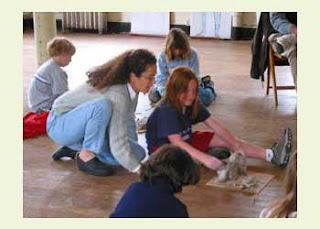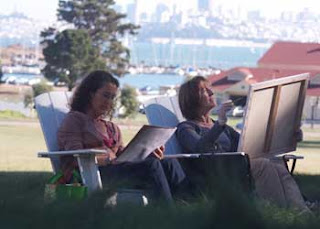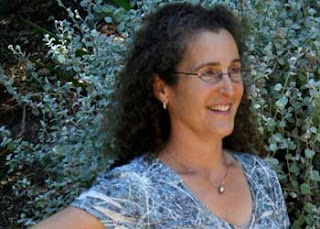 1. What medium do you feel the most connected to and why?
1. What medium do you feel the most connected to and why?
Its very hard to pick just one medium. Drawing is fundamental. I think its easiest to talk about what I'm seeing in pencil. And I can add my thoughts and feelings about a thing or a place with pencil easily. So in graphite I can draw what I see - what I'm actually looking at - I can also draw what I think or feel. I can describe a lot with my
marks. They come right out of me, of who I am, of my seeing and my feeling.
But watercolor is very expressive, too.
Lately I've been painting in oil. I get a strong response to colors. Today, seeing a cadmium orange next to a light olive green that had white in it made me so excited. And then placing different intensities of that light olive green in different places, next to different colors was so much fun! Really, it was very exciting to work with this thick oily material that had such color to it!
And then there is clay and wax for sculpting. It just doesn't end...

2. When helping a student, what do you think is the most important advice you give?
In my classes I like to offer structure and safety for moving through a variety of art techniques and issues. I always start with and return to this: try to draw or paint from honesty, from truth, from your authentic vision rather than from some idea of what you think something looks like.
Draw from your eyes, not your brain.
3. Why create? Why art?
I make art because it lets me connect with myself and be focused on things that matter to me.
It also teaches me so much about life. I have learned many, many life lessons through painting, drawing, and sculpting.
There were things that were hard growing up. Looking at art and making art helped me feel better about my world. It helped me to figure out how to maneuver through life so that I was more comfortable. It helped me to see my world better, and more authentically.
4. Who makes the best student?
Anyone who is curious about their own creativity, and wants to learn more about themselves and/or art.
5. Where would a new art student best begin?
I love to start a new class with a few simple exercises that show people the difference between drawing what we think, and drawing what we see. It's the starting place for drawing from observation.
6. What do you do to keep your craft new and fresh?
I look at a lot of art. I go to museums and galleries, and I scour the Internet and newspapers and magazines for images I like. I also listen to my kids, to my husband and my friends and my students. I try to share myself with others and to appreciate what I see and learn from others. I try to be real, and honest, and to let myself touch the wonders of life.
7. Have you ever thought about illustrating a book? Writing a book?
I have thought of illustrating a book but I think it would be confusing because it might be too abstract. I'd like to write about teaching art.
 8. You believe drawing what we see is like a meditation. How so?
8. You believe drawing what we see is like a meditation. How so?
I think that meditation is about going away from the bustle and fuss of life and connecting with self, and maybe with universe, in a non focused way. That is: connecting without forcing the connection.
When we draw, if we can truly connect with our objects in a way that is about our eyes rather then our brains, then it is like a meditation. We go away from all of life's activity and settle down to look intensely at something and to record what we see.
When the drawing is done its as though we "wake up" from our other world of drawing and come back to our regular life. But we get to come back with a record of where we've been.
It's even better then mediation because we get something to look at from the time spent. Connecting with an object by looking rather than listening to what our brain says about the form isn't so far from connection with self, or connection with universe.
 After a new class has been going for some time I like to do an exercise where we all draw each other. It means that we have to look really closely at another person. I like to draw with my students for this. I always feel honored to be able to look so closely at someone and to record what I see and to enjoy that person's beauty.
After a new class has been going for some time I like to do an exercise where we all draw each other. It means that we have to look really closely at another person. I like to draw with my students for this. I always feel honored to be able to look so closely at someone and to record what I see and to enjoy that person's beauty.
Authentic looking - looking without judgement in order to merely record what one sees without our brain telling us what it should look like - makes me feel as though I've been in a trance of connection. If I'm trying to figure out what the nature of the curve of an eyebrow is by looking intensely at it, there is no room for judgement.
There is only amazement at what a person really looks like. If I can connect with another's beauty then I connect with my own as well. What an amazing thing!
9. What is the realist tradition?
The realist tradition in drawing and painting is making things look real. To do this one needs to pay close attention to shapes and spaces and edges of forms, as well as how light moves over the surface of forms.
10. What is it like for an artist who loves currents to live around so much water?
Oh, its the best! I'm also a swimmer. And I LOVE all the water around us. And the wind and the sky - lots of currents up there, too. I know I live in one of the most beautiful places there is! I take much inspiration from nature.
 11. What ages do you teach?
11. What ages do you teach?
I teach all ages. I've worked with children from age four up, and I work with many adults. I've taught a lot of teenagers, and I have had a few quite elderly students as well.
12. How did you start your business of teaching, and why?
I started teaching privately as I was gearing up to have a family. It allows me to share my love of the process of learning and my life's focus in art with a variety of people at the same time that I'm living with my husband and raising my three boys.
13. How can my blog readers help you to become an even bigger success?
Take a class! Share your process - talk about what seems interesting about this to you. Ask a question, send a picture, talk about it!
 Halloween is my favorite of all the holidays! Seriously, I wish we would dress up all year. I love it. Right now I am sporting hot pink hair "for Halloween" but will ultimately not wash out for 3 months. Ha! I am my inner child in October.
Halloween is my favorite of all the holidays! Seriously, I wish we would dress up all year. I love it. Right now I am sporting hot pink hair "for Halloween" but will ultimately not wash out for 3 months. Ha! I am my inner child in October. Zombies also have a special place in my heart. I love them too! I love them so much, that me and my 9-year-old son have been working on a Zombie picture book. It bites! --- literally.
Zombies also have a special place in my heart. I love them too! I love them so much, that me and my 9-year-old son have been working on a Zombie picture book. It bites! --- literally.
























